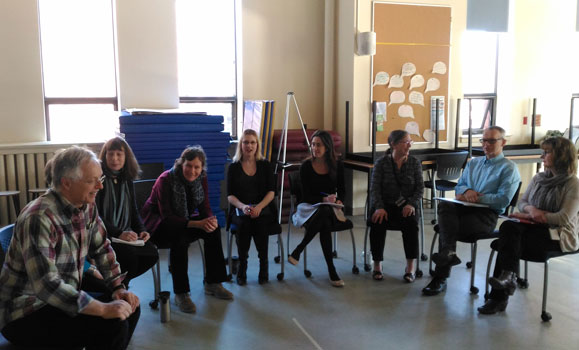News
» Go to news mainInterprofessional team host Participatory Action Research Training

In late April, sixteen community partners and nineteen research faculty (including postdoctoral fellows and graduate students) from Nova Scotia participated in two separate PAR training sessions at Dalhousie University. This initiative was funded by a NSHRF Catalyst Award received by an interprofessional project team comprised of FHP faculty members Heidi Lauckner (Lead - School of Occupational Therapy), Rob Gilbert (Health Sciences), Lois Jackson (HPI and School of Health and Human Performance), Jessie-Lee McIsaac (HPI), Grace Warner (Occupational Therapy) and Cathy White (Occupational Therapy). The award supported research capacity building amongst seven established research teams and ten individual researchers/community partners. Research teams are engaged in community-based projects related to a broad range of topics, such as recreation and mental health/chronic conditions, supporting caregivers and volunteers within palliative care, early childhood development, and resilience amongst Mi’kmaw youth.
PAR training provided participants with fundamental skills and attitudes for fostering collective inquiry supporting future experimentation that is grounded in both experience and social histories. The Catalyst Award will also support the initiation of an informal community of practice that will provide opportunity for continued learning and sharing of PAR tools and projects. The collective experience of the training was well summarized by one participant who stated: “We now have brilliant techniques to illicit data in real time and where people can be active participants in the data analysis”
Recent News
- Applications open for Leon & Rose Zitner Prize
- Practicing what we preach: The importance of leisure and recreation for those who study, teach and work in health
- Dal Health announces new Associate Dean, Equity and Inclusion
- New Director announced for College of Pharmacy
- PhD in Health candidate recognized for her innovation in cancer research
- Dal Health’s School of Nursing to offer Atlantic Canada’s First Master of Nursing, mental health and addictions
- Dr. Catherine Mah is taking aim at social impacts on food purchasing and diet
- Faculty of Health research project finds creative culmination in Nocturne 2023 exhibit
